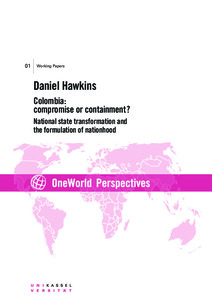Date
2008Metadata
Show full item record
Working paper

Colombia: compromise or containment?
(National state transformation and the formulation of nationhood)
Abstract
The design, reformulation, and final signing of Plan Colombia by the then US President, Bill Clinton, on the 13 July 2000 initiated in a new era of the US State´s involvement in supposedly sovereign-territorial issues of Colombian politics. The implementation of Plan Colombia there-on-after brought about a major realignment of political-military scales and terrains of conflict that have renewed discourses concerning the contemporary imperialist interests of key US-based but transnationally-projected social forces, leading to arguments that stress the invigorated geo-political dimension of present-day strategies of capitalist accumulation.
With the election of Álvaro Uribe Vélez as Colombian President in May 2002 and his pledge to strengthen the national military campaign aganist the region´s longest-surviving insurgency guerrilla group, Las FARC-EP, as well as other guerrilla factions, combined with a new focus on establishing the State project of “Democratic Security”; the military realm of governance and attempts to ensure property security and expanding capitalist investment have attained precedence in Colombia´s national political domains.
This working paper examines the interrelated nature of Plan Colombia -as a binational and indeed regional security strategy- and Uribe´s Democratic Security project as a means of showing the manner in which they have worked to pave the way for the implementation of a new “total market” regime of accumulation, based on large-scale agro-industrial investment which is accelerated through processes of accumulation via dispossession. As such, the political and social reconfigurations involved manifest the multifarious scales of governance that become intertwined in incorporating neoliberalism in specific regions of the world economy. Furthermore, the militarisation-securitisation of such policies also illustrate the explicit contradictions of neoliberalism in a peripheral context, where coercion seems to prevail, something which leads to a profound questioning of the extent to which neoliberalism can be thought of as a hegemonic politico-economic project.
With the election of Álvaro Uribe Vélez as Colombian President in May 2002 and his pledge to strengthen the national military campaign aganist the region´s longest-surviving insurgency guerrilla group, Las FARC-EP, as well as other guerrilla factions, combined with a new focus on establishing the State project of “Democratic Security”; the military realm of governance and attempts to ensure property security and expanding capitalist investment have attained precedence in Colombia´s national political domains.
This working paper examines the interrelated nature of Plan Colombia -as a binational and indeed regional security strategy- and Uribe´s Democratic Security project as a means of showing the manner in which they have worked to pave the way for the implementation of a new “total market” regime of accumulation, based on large-scale agro-industrial investment which is accelerated through processes of accumulation via dispossession. As such, the political and social reconfigurations involved manifest the multifarious scales of governance that become intertwined in incorporating neoliberalism in specific regions of the world economy. Furthermore, the militarisation-securitisation of such policies also illustrate the explicit contradictions of neoliberalism in a peripheral context, where coercion seems to prevail, something which leads to a profound questioning of the extent to which neoliberalism can be thought of as a hegemonic politico-economic project.
Collections
OneWorld Perspectives (Fachgebiet Internationale und intergesellschaftliche Beziehungen)Citation
@unpublished{urn:nbn:de:hebis:34-2010110234857,
title={Colombia: compromise or containment?},
year={2008}
}
0500 Oax
0501 Text $btxt$2rdacontent
0502 Computermedien $bc$2rdacarrier
1100 2008$n2008
1500 1/eng
2050 ##0##urn:nbn:de:hebis:34-2010110234857
4000 Colombia: compromise or containment?
:National state transformation and the formulation of nationhood /
4030
4060 Online-Ressource
4085 ##0##=u http://nbn-resolving.de/urn:nbn:de:hebis:34-2010110234857=x R
4204 \$dWorking paper
4170 OneWorld Perspectives ;; 01/2008
5550 {{Kolumbien}}
5550 {{Politik}}
7136 ##0##urn:nbn:de:hebis:34-2010110234857
<resource xsi:schemaLocation="http://datacite.org/schema/kernel-2.2 http://schema.datacite.org/meta/kernel-2.2/metadata.xsd"> 2010-11-02T12:32:04Z 2010-11-02T12:32:04Z 2008 1863-0928 urn:nbn:de:hebis:34-2010110234857 http://hdl.handle.net/123456789/2010110234857 eng Universität Kassel, Fachbereich Gesellschaftswissenschaften, Fachgebiet Internationale und Intergesellschaftliche Beziehungen Urheberrechtlich geschützt https://rightsstatements.org/page/InC/1.0/ 320 330 Colombia: compromise or containment? Working paper The design, reformulation, and final signing of Plan Colombia by the then US President, Bill Clinton, on the 13 July 2000 initiated in a new era of the US State´s involvement in supposedly sovereign-territorial issues of Colombian politics. The implementation of Plan Colombia there-on-after brought about a major realignment of political-military scales and terrains of conflict that have renewed discourses concerning the contemporary imperialist interests of key US-based but transnationally-projected social forces, leading to arguments that stress the invigorated geo-political dimension of present-day strategies of capitalist accumulation. With the election of Álvaro Uribe Vélez as Colombian President in May 2002 and his pledge to strengthen the national military campaign aganist the region´s longest-surviving insurgency guerrilla group, Las FARC-EP, as well as other guerrilla factions, combined with a new focus on establishing the State project of “Democratic Security”; the military realm of governance and attempts to ensure property security and expanding capitalist investment have attained precedence in Colombia´s national political domains. This working paper examines the interrelated nature of Plan Colombia -as a binational and indeed regional security strategy- and Uribe´s Democratic Security project as a means of showing the manner in which they have worked to pave the way for the implementation of a new “total market” regime of accumulation, based on large-scale agro-industrial investment which is accelerated through processes of accumulation via dispossession. As such, the political and social reconfigurations involved manifest the multifarious scales of governance that become intertwined in incorporating neoliberalism in specific regions of the world economy. Furthermore, the militarisation-securitisation of such policies also illustrate the explicit contradictions of neoliberalism in a peripheral context, where coercion seems to prevail, something which leads to a profound questioning of the extent to which neoliberalism can be thought of as a hegemonic politico-economic project. open access National state transformation and the formulation of nationhood OneWorld Perspectives ;; 01/2008 Kolumbien Politik OneWorld Perspectives 01/2008 </resource>
The following license files are associated with this item:
Urheberrechtlich geschützt

